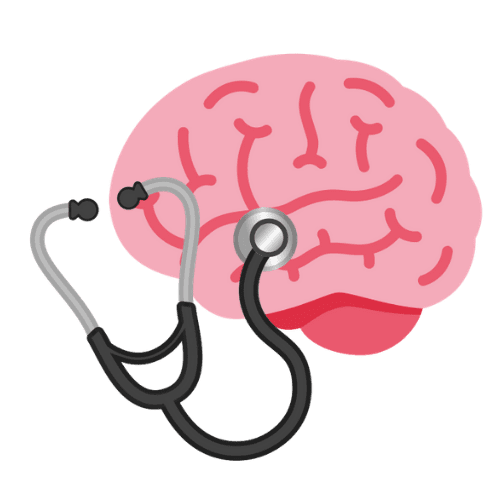What is working memory, and how does it relate to ADHD? How is object permanence different? I’ll explain the science behind it all in this post.
“If I can’t see it, it doesn’t exist.”
Have you ever heard that classic ADHD quote before?
It describes something called object permanence.
Object permanence is the understanding that something continues to exist even if you aren”t looking at it. This explains why babies get so surprised playing peek-a-boo; they haven’t developed object permanence yet, so when you cover your face, they don’t understand that it still exists. I wish I could forget the faces of some people I know…
Out of sight, out of mind?
People with ADHD don’t actually have a problem with object permanence, as we did develop it in early childhood. However, our issues are similar. Put something in a drawer and forget that it’s there, that it’s even an object you possess? This is common in ADHD, and might be incorrectly described as impaired object permanence. It is actually associated with our difficulties with working memory.
What is working memory?
Working memory is the ability to retain and use information during a short period of time. It is managed in the frontal lobe of the brain. This is where a lot of processes impaired in ADHD are controlled – including working memory. We need working memory to hold information in our heads while we perform tasks like reasoning, comprehension and learning. In short, it allows us to use new information when we’re in the middle of doing something.
Working memory evolved from the concept of short-term memory. Let’s put it into context. To test short-term memory, you might ask someone to repeat a sequence of numbers back to you. To test working memory, you would ask them to memorise the numbers while juggling. Then you would add in an extra ball. Only after that would you ask them to repeat the numbers… in reverse order. It’s all about using the information – holding it in your mind and then manipulating it as part of a task.
Ever gone into a room and forgotten what you went in for? Memorise a phone number only to get distracted and forget it 20 seconds later? That’s your working memory not playing ball.
Interestingly, this problem doesn’t just apply to objects.
It happens with people too.
Picture the scene. You run into a friend in town, and they seem a bit annoyed with you… but you aren’t sure why. You decide to ask – it turns out they haven’t heard from you in months and missed you. It suddenly dawns on you that you genuinely haven’t been in touch. However, it was completely unintentional. When you weren’t in the presence of your friend, you just sort of forgot that they… exist. It’s nothing personal, you were just preoccupied with what was in front of you. This also interplays with our problems with time perception – you didn’t even realise it had been that long.
But now you feel bad.
This is just one way that ADHD can erode our relationships, without us even being aware that it’s happening. I regularly experience waves of guilt about the friendships I’ve let break down over the years. I’m too ashamed to get back in touch, because of the worry that they think I was too lazy to keep in touch, or just didn’t care.
Studies have also shown that working memory impairments are pervasive in university students with ADHD, and negatively impact their GPAs.
Students with ADHD can often have an average or high IQ, but test results and a struggle with learning that don’t reflect this. This is why two students with the same IQ can have grades on opposite ends of the scale. One might have ADHD, and the associated working memory deficits.
I have personal experience of this. I struggled a lot with academics during my first two years of medical school, prior to my diagnosis of combined-type ADHD in the summer after my second year exams. Although I never failed an exam, I barely scraped passes, despite working to the point of burn-out every semester.
This was incredibly frustrating for me. I tried every method of revising, from mindmaps, to videos, to teaching, to flashcards. In the exam post-mortem with my academic tutor every semester, I would explain that I did understand the content we were learning. I just couldn’t remember it.
One question about intracellular signalling mechanisms in my summer exams is very clear in my memories. I was asked to explain the process, and could draw a diagram and explain it. However, I couldn’t remember the names of the molecules, their subunits or the appropriate enzymes in the right order. They were all jumbled and foggy in my head. Despite describing the process clearly, I lost nearly all the marks because I couldn’t name the elements involved.
I ended up on “conditions” when I entered my second year. I had to pass my exams in 12 weeks time, on the first attempt, or I would lose my place at medical school. In a particularly inconvenient turn of events, my Dad was diagnosed with cancer a few weeks into the semester.
Although this circumstance absolved me of the “on the first attempt” condition, I still had to pass. The result was my stress levels shooting through the roof, the inevitable onset of a bout of depression and generalised anxiety disorder, and spending the Christmas period on another course of fluoxetine.
Still no one had questioned why I was struggling so much, although the signs of undiagnosed adult ADHD were very obvious in retrospect. I ended up passing the semester by a magnificent 1%, and the whole affair was swept under the rug until I realised I had ADHD a few months later.
So what are the consequences?
ADHD working memory affects both the big, like relationships and academics, and the simple. If I don’t set a timer when I put something in the oven, not staring at the oven for the duration of the cooking time means a burned dinner.
Half the food I buy never gets eaten. If I can’t see it clearly when I open the fridge, if it’s under a few other things, it doesn’t exist in my eyes until it’s the last thing in the fridge… and very clearly not safe to eat.
There are strategies you can try to minimise the damage of an impaired working memory.
1) Reminders… everywhere.
Have a running list of what food you buy and put in places you can’t immediately see, like your fridge and cupboards. Put use-by dates on the list, and cross items off as you eat it.
Set up a recurring reminder to pop up on your phone to keep in touch with people. For example, “phone grandma on Sunday”. It sounds robotic, but it gets you into a habit. It’s also better than the alternative of your loved ones getting hurt feelings about something completely unintentional on your part.
2) Never put anything out of sight.
“Out of sight, out of mind” isn’t a problem if everything is always in your sight.
I am in no way advocating for you to embrace a life of mess, because eventually things will be put out of sight by the growing piles of clutter. Just remove the physical barrier to forgetting things – clear storage bins are an ADHD brain’s best friend. If necessary, put glass doors on your cupboards, or take them off entirely.
I personally found that the book Organising Solutions for People with ADHD has lots of good ideas for ADHD-friendly organisation.
3) Talk to yourself.
If there’s something you’ve got to remember, like grabbing your glasses and laptop when you go upstairs, and you know distraction will make you forget it… just repeat it aloud to yourself until you’ve done it. Obviously this only works in the short-term – you can’t walk around town muttering your shopping list all day. However, it might save you a few unneccessary trip around your house.
Working Memory In Research
Research has found that visual-spatial (shapes, colours and their locations) working memory is a great identifier of school children with ADHD, and so could be a potential tool to identify the undiagnosed in the classroom. Studies have also shown that children’s attentive behaviour decreased when demands on their working memory increased, and this effect was even greater for children with ADHD. This is interesting, as evidence has emerged that some children with ADHD are not more inattentive than those without the disorder once working memory deficits are controlled for.
This might explain why we can easily focus on tasks that don’t require much working memory, like watching TV and playing Animal Crossing, but stare out the window in classes or at work.
Some scientists are researching ways to train working memory and improve it, but the different types of working memory, and the interplay between it and other aspects of executive functioning (like attentiveness) are making it difficult. Overall though, the evidence for working memory problems being a key ADHD symptom is certainly there.
Hopefully my Mum can now understand why giving me a list of jobs while I’m in the middle of doing something isn’t going to work…
Further reading:
If you’re interested in learning more about the science behind ADHD, and decoding another common term, you can read my post about executive functioning here.
Working Memory (Baddeley, 2010): here
A Pilot Study of Working Memory and Academic Achievement in College Students With ADHD (Gropper et al., 2009): here
Children with low working memory and children with ADHD: same or different? (Holmes et al., 2014): here


